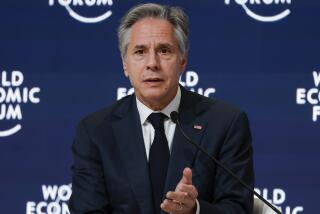Christopher Lobbies for Boost in Foreign Aid
WASHINGTON — Raising the prospect of cuts in U.S. economic support to the Middle East if funding of America’s foreign aid is reduced further, Secretary of State Warren Christopher on Wednesday challenged Congress to provide the money that he says is vital to maintaining American global leadership.
“I have to tell you that aid to Israel and Egypt and Jordan will inevitably come under pressure, possibly irresistible pressure, if our other assistance programs continue to be decimated,” Christopher told an audience at Harvard University in Cambridge, Mass.
He said that overall U.S. foreign aid has declined by more than one-third in the last 10 years. “I urgently and earnestly call on the Congress today to reassess the erosion that has taken place in our diplomatic readiness,” he added.
The comments, made at a speech four days before he leaves office and three weeks before President Clinton’s 1998 budget request goes to Capitol Hill, constitute the strongest public remarks Christopher has made on the funding issue. They are likely to add to pressure on Congress to consider favorably the administration’s request for a $1-billion increase next year in foreign affairs spending.
The speech also was the first time Christopher has raised publicly the possibility that U.S. economic support for its Middle East allies might come under scrutiny.
Since the Camp David accords that brought peace between Israel and Egypt were signed almost two decades ago, aid to those nations has formed the centerpiece of U.S. foreign assistance, with Israel this year expecting to receive $1.2 billion and Egypt $815 million. Jordan will receive $17.3 million. The aid is one important factor for the high level of U.S. influence in the region.
Clinton’s 1998 budget request of $19.5 billion for foreign aid has sparked a flicker of optimism in the country’s foreign policy establishment. The president’s 1996 balanced-budget proposal called for a gradual decline in foreign affairs spending through 2002.
Christopher called the funding issue “the biggest crisis we’re facing in our foreign policy today.”
Initial soundings in Congress indicate that the president’s request may get a more receptive hearing than in recent years, in part because of Christopher’s lobbying efforts but also because of a growing awareness that the cumulative effect of previous cuts now threaten the ability of the U.S. to exert diplomatic influence.
More to Read
Get the L.A. Times Politics newsletter
Deeply reported insights into legislation, politics and policy from Sacramento, Washington and beyond. In your inbox three times per week.
You may occasionally receive promotional content from the Los Angeles Times.










